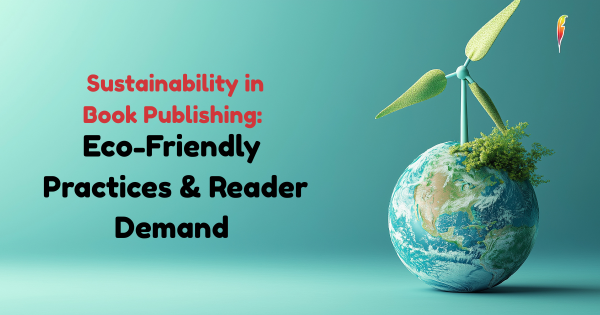How to Be Successful as a First-Time Author: From Aspiring Writer to Published Author
Becoming a writer and author is an aspiration shared by countless individuals around the world. Many people harbour a burning desire to publish a book but often feel overwhelmed by the challenges that come with it. If you're one of those aspiring authors with little to no experience in book writing, fear not! This blog will guide you through the journey from aspiring writer to published author, covering essential topics and strategies to help you succeed.
Introduction to Becoming a Writer and Author
Writers and authors play a pivotal role in shaping our world through their words. They transport readers to different realms, ignite emotions, and challenge perceptions. The journey of a first-time author begins with a passion for storytelling and a willingness to embark on an exciting, albeit challenging, adventure.
Writing, at its core, is a deeply personal endeavour. It allows you to express your thoughts, emotions, and creativity in a tangible form. Whether you're crafting a compelling novel, a thought-provoking non-fiction work, or a collection of poetry, the process of putting words on paper is both exhilarating and challenging.
Overcoming the Challenges of Being a First-Time Writer
Every writer, including first-time authors, faces hurdles on their path to publication. These challenges often include self-doubt, writer's block, and fear of rejection. Embrace these obstacles as opportunities for growth and use them to fuel your determination to succeed.
Self-Doubt:
As an aspiring author, it's normal to doubt your abilities. You may wonder if your ideas are worth sharing or if your writing is good enough. Remember that even seasoned authors experience moments of self-doubt. To overcome this, focus on your passion for storytelling and the desire to share your unique perspective with the world.
Writer's Block:
Writer's block can strike at any stage of your writing journey. When it does, don't panic. Take a break, go for a walk, or engage in creative activities unrelated to writing. Often, these breaks can rejuvenate your creativity and help you overcome the block.
Fear of Rejection:
The fear of rejection is a common concern for aspiring authors. Not every literary agent or publisher will accept your work, but that doesn't diminish its value. Keep in mind that J.K. Rowling, author of the Harry Potter series, faced numerous rejections before achieving success.
Developing Your Writing Skills and Finding Your Unique Voice
Before you publish a book, it's crucial to hone your craft. Developing your writing skills involves continuous learning and improvement. Here are some steps to help you on your journey:
1. Read Widely:
Reading is one of the most effective ways to improve your writing. Read books in your chosen genre, but don't limit yourself. Explore different styles and authors to gain a broader perspective on storytelling.
2. Write Regularly:
Writing is like a muscle that needs regular exercise. Set aside dedicated time each day or week to write. Consistency is key to progress.
3. Seek Feedback:
Don't be afraid to share your work with trusted friends, writing groups, or readers. Constructive feedback can help you identify areas for improvement.
4. Experiment with Styles:
Explore various writing styles and genres to find what resonates with you. Your unique voice is what will set you apart from other authors.
Setting Realistic Goals and Creating a Writing Routine
Successful writers are disciplined and organized. Setting clear, achievable goals is essential for making progress in your writing journey. Here's how to do it:
Goal Setting:
Define both short-term and long-term goals. Short-term goals could include completing a certain number of words per day or finishing a chapter by a specific date. Long-term goals might involve completing your manuscript within a year or getting your book published.
Creating a Writing Routine:
Establishing a writing routine is crucial to maintaining consistency. Determine the best time of day for your writing and commit to it. Whether it's early morning, late at night, or during lunch breaks, consistency is essential.
Writing Your First Book - Tips and Strategies
The prospect of writing an entire book can be daunting. However, breaking the process into manageable steps can make it more achievable. Here are some tips and strategies to help you write your first book:
1. Start with an Outline:
Before diving into writing, create an outline of your book. Outline the main plot points, character arcs, and key events. Having a roadmap will keep you on track.
2. Set Deadlines:
Establish realistic deadlines for completing each section or chapter of your book. Deadlines provide a sense of urgency and accountability.
3. Read Widely in Your Genre:
To write well in a specific genre, you need to be well-versed in it. Read extensively in your chosen genre to understand its conventions and expectations.
4. Embrace Rewriting:
Your first draft is just that—a draft. Don't be afraid to rewrite and revise. Writing is rewriting, and the editing process is where your manuscript truly shines.
5. Find Inspiration:
Seek inspiration from your favourite authors. Analyse what makes their writing captivating and apply those techniques to your work.
Editing and Revising Your Manuscript
Once you've completed your manuscript, the real work begins. Editing and revising are vital steps in ensuring your book is polished and ready for publication. Here's how to approach this phase:
Self-Editing:
Begin by reviewing your manuscript for grammar, spelling, and punctuation errors. Pay attention to clarity and consistency in your writing.
Professional Editing:
Consider hiring a professional editor to review your manuscript. An editor can provide valuable feedback on structure, style, and overall quality.
Beta Readers:
Engage beta readers who can offer fresh perspectives. They can identify plot holes, character inconsistencies, and areas that may need improvement.
Finding a Literary Agent and Traditional Publishing Options
Many aspiring authors aspire to traditional publishing, which often involves securing a literary agent. Here's how to navigate this process:
Research Literary Agents:
Identify literary agents who specialise in your genre. Research their submission guidelines and tailor your query letter and book proposal to each agent.
Craft a Compelling Query Letter:
Your query letter is your first impression on a literary agent. Make it concise, engaging, and reflective of your story's essence.
Book Proposal:
A well-structured book proposal should include a synopsis of your book, information about your target audience, a marketing plan, and details about your platform as an author.
Be Prepared for Rejections:
Rejection is a common part of the querying process. Be prepared for rejection, but don't let it deter you. Keep submitting to other agents and publishers.
Hybrid-Publishing Your Book - Pros and Cons
In recent years, partnership or hybrid publishing has gained popularity as a middle ground between traditional and self-publishing. Assess the pros and cons of this approach to determine if it's the right fit for your book.
Pros of Partnership or Hybrid Publishing:
- Greater control over your book's production.
- Potentially higher royalties compared to traditional publishing.
- Access to professional editing and design services.
Cons of Partnership or Hybrid Publishing:
- Upfront costs for publishing and marketing.
- May require more hands-on involvement in the publishing process.
- Limited distribution and marketing support compared to traditional publishing.
Marketing and Promoting Your Book as a First-Time Author
Marketing is a critical aspect of your journey to becoming a successful author. Here's how to approach book marketing as a first-time author:
Develop a Marketing Plan:
Create a comprehensive marketing plan that outlines your strategies for promoting your book. Include social media promotion, book launch events, and seeking book reviews.
Build Your Online Presence:
An author platform is your online presence as a writer. Build a website, engage with your audience on social media, and create an email list to connect with your readers directly.
Utilise Book Promotion Services:
Consider using book promotion services, such as Amazon Advertising or book promotion websites, to reach a wider audience.
Leverage Book Launch Events:
Host book launch events, either in person or online, to generate excitement and engage with your readers. Offer signed copies, giveaways, or exclusive content as incentives.
Building Your Author Platform and Connecting with Readers
Connecting with readers is an essential part of being a successful author. Here are some ways to build your author platform and connect with your audience:
1. Author Website:
Create a professional author website that showcases your work, provides information about yourself, and offers a way for readers to contact you.
2. Social Media Presence:
Engage with readers on social media platforms relevant to your genre. Share insights into your writing process, book updates, and connect with your audience on a personal level.
3. Newsletter:
Start an email newsletter to keep your readers informed about your latest releases, exclusive content, and upcoming events.
4. Attend Book Events:
Participate in book fairs, author readings, and literary events to meet readers and fellow authors. Networking can open doors to new opportunities.
Dealing with Rejection and Staying Motivated
Rejection is an inevitable part of the writing and publishing journey. To stay motivated, it's essential to develop resilience and maintain a positive mindset.
1. Rejection as Feedback:
Rather than viewing rejection as a failure, see it as feedback. Use rejection letters or feedback from beta readers and editors to improve your writing.
2. Support System:
Lean on your support system, whether it's friends, family, or fellow writers. They can provide encouragement and perspective during challenging times.
3. Set Realistic Expectations:
Understand that success as an author takes time. Celebrate small victories along the way, such as finishing a chapter or receiving positive reviews.
Celebrating Your Success - The Journey from Aspiring Writer to Published Author
Finally, when your book is published, take a moment to celebrate your success. Your journey from an aspiring author to a published one is a remarkable achievement. Share your joy with friends, family, and your growing reader community. Remember, every successful author started as an aspiring writer, and you have the potential to make your mark in the world of literature.
Additional Resources and Courses for First-Time Writers
The world of writing offers a wealth of resources and courses to support first-time writers in their journey. Here are some additional steps you can take:
Join Writing Communities:
Explore online writing communities and forums where writers share their experiences and provide support and advice.
Enroll in Writing Courses:
Consider enrolling in writing courses, either in-person or online. Many universities and organisations offer courses on various aspects of writing.
Seek Writing Workshops:
Participate in writing workshops to refine your skills and receive feedback from experienced writers and instructors.
Read Writing Guides:
Explore writing guides and books on the craft of writing. Classics like "On Writing" by Stephen King and "Bird by Bird" by Anne Lamott offer valuable insights.
Attend Writer Conferences:
Writer conferences provide opportunities to network with industry professionals, attend workshops, and pitch your work to literary agents and publishers.
Becoming a writer and author as a first-time author may seem like an intimidating endeavour, but with dedication, perseverance, and the right guidance, you can turn your dream of publishing a book into a reality. Remember, every successful author started as an aspiring writer, and you have the potential to make your mark in the world of literature. Embrace the journey, write with passion, and watch your authorship flourish. Good luck!
Would you like to explore more enlightening blog posts and articles? Feel free to get in touch with Austin Macauley. Additionally, if you're eager to see your own literary creation in print, don't hesitate to submit your manuscript. Our online application form simplifies the process, making it quick and accessible.
Join our ever-growing community of authors and avid readers. Stay abreast of our latest releases and exciting events by becoming a part of our pages on Facebook, Twitter, and Instagram. Let's embark on this literary journey together!
We use cookies on this site to enhance your user experience and for marketing purposes.
By clicking any link on this page you are giving your consent for us to set cookies



